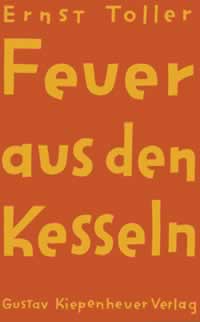Feuer aus den Kesseln (German Edition)
Contents:
During his time in prison he wrote many plays. Toller fled to England in and continued writing. In he moved to the United States and wrote film scripts. In Toller travelled to Spain and began organizing relief efforts.
Ernst Toller
From the description of Ernst Toller papers, inclusive , bulk. Ernst Toller was born in Samotschin in He studied law in Grenoble and volunteered for World War I, but was relieved from his duties because of medical reasons in He continued his studies in Munich and became friends with Kurt Eisner. In July he was arrested for treason and sentenced to five years in prison. During his imprisonment he wrote several plays and moved to Berlin after his release in In , he moved to Switzerland and later immigrated to England and the US.
bahana-line.com: Ernst Toller: Books
He died in Toller had emigrated to the U. Else Toller was Ernst's cousin and also a close friend; she lived in New York City and was a physician, apparently still completing an internship. Ernst Peter Tal was a Viennese publisher, the head of E.
University of Pennsylvania Library. Ernst Toller was a German playwright and activist. Scarred emotionally by the bloodshed he witnessed as a soldier in World War I, he began speaking against the war and was imprisoned, where he wrote a drama based on his experiences.
Transfiguration is an exemplary work of the expressionist theater. The title points to that transformation of heart and soul which is the theme of many expressionist plays. The drama proceeds in a series of stages Stationen and depicts a man's "way. The horrors of war transform the hero from a patriotic volunteer to a revolutionary fighter for humanity. In he was jailed for 5 years for his part in the abortive Eisner coup. These works express the disillusionment of the frustrated revolutionary.

The former is cast in the abstract expressionist mold, the characters being representative types, the Woman, the Husband, and so on. The Woman represents the humane idealist who longs for change but abhors violence; and her antagonist, the Nameless One, regards violence as necessary and subordinates the individual ruthlessly to the supposed welfare of the masses. The Machine-wreckers is a more realistic play based on the Luddite disturbances in England in ; here again the hero is a social idealist destroyed by the hate of those he wishes to save.
Of Toller's further plays the most notable is Hinkemann , an interesting treatment of the returning soldier motif.
Access Check
Toller moves away from avant-garde technique and abstract characters both here and in Hoppla, wir leben! The tragedy of Toller's themes reflects the disillusionment of his life. He left Germany in and committed suicide in New York on May 22, Toller's autobiography is I Was a German ; trans.
- Toller’s ‘Draw the Fires’ « Great War Fiction.
- The Pink Triangle: The Nazi War Against Homosexuals.
- Total Textbooks.
- Total Textbooks?
A full-length treatment of Toller in English is William A. Willebrand, Ernst Toller and His Ideology Spalek, Ernst Toller and His Critics , gives a comprehensive bibliography.
Buy Feuer aus den Kesseln (German Edition): Read Kindle Store Reviews - bahana-line.com Feuer Aus Den Kesseln (German Edition) [Ernst Toller] on bahana-line.com *FREE* shipping on qualifying offers. Reproduktion des Originals in Großdruckschrift.
A useful short account can be found in Hugh F. Toller, Ernst, I was a German: The Woman represents the humane idealist who longs for change but abhors violence; and her antagonist, the Nameless One, regards violence as necessary and subordinates the individual ruthlessly to the supposed welfare of the masses. The Machine-wreckers is a more realistic play based on the Luddite disturbances in England in ; here again the hero is a social idealist destroyed by the hate of those he wishes to save.
Of Toller's further plays the most notable is Hinkemann , an interesting treatment of the returning soldier motif. Toller moves away from avant-garde technique and abstract characters both here and in Hoppla, wir leben! The tragedy of Toller's themes reflects the disillusionment of his life.
Related Video Shorts (0)
He left Germany in and committed suicide in New York on May 22, Toller's autobiography is I Was a German ; trans. A full-length treatment of Toller in English is William A. Willebrand, Ernst Toller and His Ideology Spalek, Ernst Toller and His Critics , gives a comprehensive bibliography.
A useful short account can be found in Hugh F. Dove, Richard, He was a German:
- Masse Mensch.
- Further Reading;
- Recent Advances in Earthquake Geotechnical Engineering and Microzonation (Geotechnical, Geological a!
- Simply Shameless (The House of Pleasure Book 3).
- Toller, Ernst, - Social Networks and Archival Context.
- bahana-line.com: Feuer aus den Kesseln (German Edition) eBook: Ernst Toller: Kindle Store!